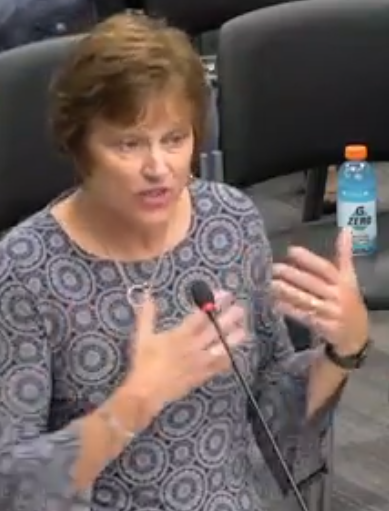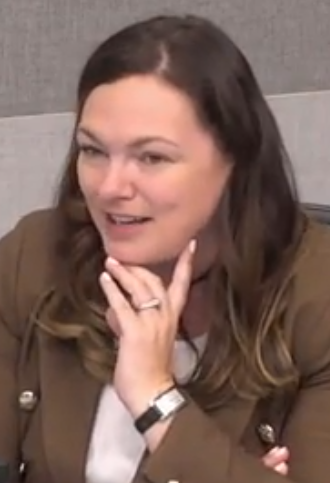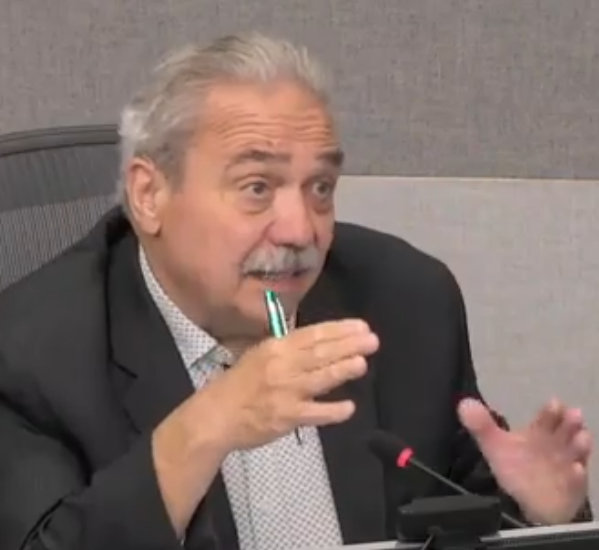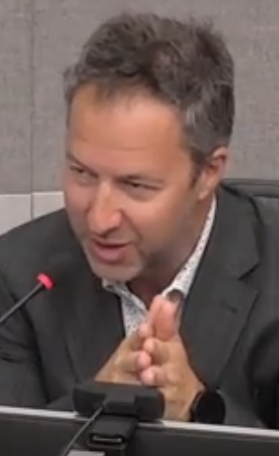June 11th, 2024
BURLINGTON, ON
For the first time in my 12 years of covering city council meetings I watched a council listen intently to a delegation and then interact with the delegation on what the community needed in the way of community engagement – which isn’t what the public has been getting so far.
Doreen Sebben is from Millcroft, so she knows who Angelo is, adding that she has not worked with him , for over the 25 years that I’ve been living in Millcroft. So I’m from Millcroft. This Saturday is my 25th anniversary of living here
“I come from the private sector. I spent 26 years at IBM; I’ve been an entrepreneur, I’ve been a consultant.”
After telling Council who she is and what she does Sebben gets into what she wants to talk about.
“We have almost a half a billion dollar budget. We have almost 200,000 people. And you have about, I don’t know what the latest count of employees is, but let’s call it 1500 so this is a big business.
“I’m semi retired now. I did a little bit of digging. I wanted to understand some of the numbers. I was very happy to see the fact that there’s a rigorous budget process, there’s dates, there’s times, there’s approval process, there’s community engagement.
“I didn’t engage. Shame on me. I just pay my tax every year. I don’t ask questions. But now that I’m semi-retired, I’m looking at my budget, my personal budget, a little bit more carefully. I’m delighted about the community engagement. I’m delighted about the fact that there’s a budget, there’s a team, lots of people, working on it.
“I found your budget. It was 700 plus pages.
“I love to work with numbers, and it took me a long time to digest about 50% of that huge document.
“It’s not resident or community consumable, it’s very detailed, so there’s an element of trust that you’re doing a great job, because there’s lots of detail. But when I asked myself, so how’s the city doing? How are we doing? I looked at the budget, and then I was happy to find that there’s this online budget open data site.
“ I found it Friday, spent half of my day digging into stuff, and then I realized there’s a disconnect on the numbers. I saw a 350 operating budget in this big document, and then I saw 240 4 million on this really nice, clean site, but not a lot of detail. So the average resident will not figure out that the rest of the budget, in addition to property taxes, is made up of the senior grants, is made up of external, internal commercial revenues.
“I bridged the numbers. It took me a while, but I did it. The average person will not sit down to do what I did on Friday afternoon. Okay? I have a simple ask. It’s really, really simple, and it doesn’t matter if you’re in private or public sector, make sure you tell your community, your residents, who are your shareholders? How we’re doing.
“So I like the budget process, but I don’t see financial metrics anywhere. Year to date, budget variants, KPIs, like just some simple stuff. We call that a scorecard, right? So if there’s a task force that may, you know, be an outcome of this session. I would be on it from a community perspective. I have limited time now because I’m paying pickle ball a couple times a week, but I would put time into this because I want to leave a legacy for the next generation, just like you do.
“I’m asking for a financial update. I’m not even calling it budget.
“Forget the budget. That’s just one element of finance. So I went digging through all your agendas. Okay? My husband thought I was nuts.
“Yesterday, I went through the agendas from January to May, and only saw budget in April. In fact, it was April, whatever it was April, something where you said, we’re preparing for the 2025 budget. I also saw something on March 4 that talked about the December financial statements.
You moved some money from retained earnings to wherever, and there was some development stuff. And I said, okay, so they talk about it, but they don’t talk about it every month. They don’t give the community a barometer, a pulse, of how we’re doing.
“That’s why nobody’s engaged. People don’t understand. But eventually, when you have an economy like this, they start to understand, because they’re on a fixed budget, somebody lost their job, they might be getting older, and all of a sudden, 10.21% resonates.
“It’s resonating in Millcroft. Let me tell you, it’s resonating in 14 holes. It’s resonating at pickleball. I’m coming here today, and I guess I timed it right, because I had some time and the budget was on the agenda today.
“My ask is, is that we have a regular cadence. You have a scorecard. I mean, this e3 is awesome, but it’s going to take a while starting with a simple scorecard, where somebody comes to tell the community how we’re doing and make it available. Succinct. I don’t want 700 pages. I want a summary, so I’m optimistic that somebody’s listening at City Hall, because there is a website.
“It’s just probably not finished yet. So if they need some input, we could help with that, because I’ll tell you what I want to see, but I’m sure a lot of people want to see something else, but it wouldn’t come when it comes to taking money out of your pocket, when you take 10.21% out of my pocket, out of your pocket, out of everybody’s pocket.
“In an economy like this, people start to disengage. People start to wonder, why am I here? I am asking Council, and I’m glad to hear that Lydia asked the same thing. She obviously has a lot more detail. She’s probably way ahead of me, but I love the data, and I’ll sink my teeth into it. But for now, I’m asking for one thing to add financial update on the agenda. Why now? Because the 10.21 is resonating.
“You guys need to re-establish credibility and trust with the community. There’s going to be an election in a couple years. You have some time to rebuild that trust.”
“We need to keep a regular pulse on almost half a billion dollar business. We’re your shareholders. You are as well. You live here, you pay taxes. So I just think that’s a reasonable ask. It’s a fiscal responsibility of every leader to establish a regular pulse of their business, whether it’s private or public or not for profit.
“And so that way, you know, if we need some more money or we have to move some money, you can see some of those things a little bit earlier. We’re not going to eliminate all surprises, but let me tell you, when you’re proactive, you could be reactive as well, but I think we can actually do a better job of staying connected as partners.
“The benefits of having financial update on every community of the whole and community of Council is there’s a pulse, there’s a cadence. People will pay attention, but don’t give them a $700 a 700 page document. Give them something net that they can consume, that they can understand, because then it gives you an opportunity to rebuild that partnership between Council and the community, because we’re all here for a reason.
“Some of the noise that I’m listening to, I’m actually annoyed. That’s why I’m here today, because this is a simple ask. It’s proactive versus reactive, which makes us all more productive and enhances the transparency and accountability of Council.
“In summary, I’m not asking for five things. I’m not asking for three things. I think I’m asking one of the things that Lydia asked for is a regular cadence for the community that’s succinct, that’s consumable, that we can take action on and that we can partner on. It’s not you versus us, it’s all of us working together.”
In terms of letting Council know where they are failing it doesn’t get much better than this.
Counsellor Lisa Kearns said she was really interested in “the way in your that you’re approaching this. What would be viewed as a scorecard or a summary deck or sort of a snapshot. This is very much a private sector thing where you would get that quarterly or monthly from all the different departments that would roll up into a scorecard.
But just use that word for simplicity, what are some of those metrics that you would want to see on that I heard about, sort of how the how the investments are doing, where we are, variance, reports, things like that. What else would be digestible to the community?
Doreen: “So, being accountable, so if we’ve approved a budget to your point, the variance the year to date, on operating and capital, right? They don’t need a full financial statement. You just need a pulse. But I think it’s for council and the community to decide what that scorecard is. I mean, I could work with somebody. That’s not a problem.
“I’ve done many scorecards, and in some organizations, it’s like a weekly thing, right? So monthly is the roll up of your financial team and this team and budget. And so there’s people that are doing this work anyway, but they’re not putting it together in a summary format, and it doesn’t need to be like one page, right year over year, right, variance and then your key performance indicators.”
Councillor Bentivegna: I guess I’m going to see you soon. I like your some of the wording you put on your slides, and I like the word proactive versus reactive, and that’s sometimes more difficult to identify.
“What kinds of things would you like to see on a monthly basis, other than just, you know, budget is the category, and not necessarily monthly, but whenever, quarterly or whatever, what would you like to see specifically.
Doreen: “On a regular basis, you want to see KPIs. You want to see here’s where our financial spending for XYZ is. What’s some of the information that would make it easier for residents to understand a little bit more?”
Bentivegna: “I really like the way you talk about a community that moves a safe community.
Doreen: “So if you look at those pillars of your business, those are your lines of business. So there should be a level of you know what’s going on in each of those, but that’s kind of the summary, right? I look at a scorecard in quadrants, right? So we talk about the money.
“The group needs to decide how much we tell them. But telling too much in 700 pages is too much like nobody will look at it. That’s, you know, that’s why I went looking for more. So operating budget, the things I just mentioned by Lisa Kearns, but I would also put a community element. What are we doing in the community? And you can think of the third and fourth quad, so that it’s not just about the money, it’s about the city and the people.”
Bentivegna: “My second question is, you mentioned engagement and council Kearns touched on as well. Would you like to see more of a citizen engagement? Or would you like to see it more a committee of the whole discussion each month, each every two months, whatever it is, how would you like to see that proceed?”
Doreen: “I’m of the mind that we have to crawl, walk, run, so I’m not going to give you the answer, but it’s a partnership, so it has to include the community, and it has to include Council. And I’ll, I’ll give you an analogy, right? So we talk about diversity inclusion, and so every organization is focusing on Diversity and Inclusion, and so they stick it on the org chart on the side, just like they did security five years ago. Now, security is part of the organization. The CEO is responsible, right? There’s credibility. If you bring things down and you don’t have a plan, you should lose your job, right?

I think the only way to do that is keep everybody accountable on the money, because at the end of the day, the residents know the buck stops with them.”
“In the sense of diversity, inclusion, it’s just like the financial partnership. It should be part of the whole so I don’t I’m always worried about committees and teams and all of that, but it has to be all of us. It can’t just be Council, and it can’t be Council appointed people, because I’ll tell you, I found the audit committee, right, and I looked at it, and it’s great.
“And I looked up these people, they’re Chartered Accountants. Not everybody in Burlington is a chartered accountant, so we need to make it simple and easy to digest. I don’t know if I answered your question then some, but you know, this is a work in process. I’ve just come here for the first time in a long time, so I met some of you during the MAD (Millcroft Against Development) scenario, but we can work together. I have confidence, but I will tell you, the community doesn’t have as much confidence as I do. There’s a lot of naysayers out there. There’s a lot of skepticism. People aren’t listening. So this community engagement is bigger than you think, and it’s bigger than I thought it was.
“I know a lot of people. We do a lot of things together. I would like to do something positive for the community that impacts the whole and I think the only way to do that is keep everybody accountable on the money, because at the end of the day, the residents know the buck stops with them.”
Councillor, Galbraith: “ I too, am from the private sector and I like to see monthly updates, but it’s usually, typically revenue expenses, like an income statement, and that’s what we want to see.
“But it’s a little bit different here, we do receive quarterly updates from our finance staff, but you have triggered some questions, and I will certainly ask them in public. So if you’re around or listening, I’ll try and get you some of those answers as to what that detail is, exactly what you want to know.
“What exactly would you like to see we get, you know, our our revenue, our biggest portion is from our taxpayer. So we get updates on how much of that is collected. You know, we get percentages of what’s collected, what’s not, what’s in arrears, like, what, what other detail in terms of revenue collection?”
Doreen: “I don’t think we need a lot. I mean, if somebody really wants to know they’ll read your financial statements. I’m looking for timely information. It’s kind of like, where are we against plan so Budget Variance, right? If people aren’t paying their bills, that’s another opportunity to go back to the public. If you have some advocates to say, Hey, why aren’t you paying your bills? Do you need some help? Right? Like, I don’t know what your AR looks like, but if I know I have an AR problem, then I go figure it out, right? So I’m not suggesting that the public sector adopt everything that we do in the private sector, but some of the stuff makes sense, like they’re shareholders residents, right? I would suggest a balanced scorecard, so it’s not just about the money, but there has to be something there. There has to be something about community, and I’m sure there’s a lot of smart people in this room that we could figure out a balanced scorecard. Then there’s something for everybody, but not just the accountants.”
Galbraith: “I’m sure we can try and commit to getting some of the information that we do now and then we could have a further discussion, or at least, you can have the discussion with Angelo at his table next time you see him.
Doreen: “What I want to reiterate is, that my ask is to have the finance and a financial update of whatever it is or whatever it morphs into, on a monthly basis at Council and community like this council of whole as well, so that there’s a regular pulse, because that I did not see. And to Lydia’s point, you know, she has some good data there, right? And there’s some things that we can, all, you know, work together on, but she’s two months behind, which means we’re all behind now, right? So that’s part of the proactive part. If there’s an acting, if there’s an active agenda item, talked about money, I think people would get more engaged, but right now they can’t find it.”
Mayor Meed Ward: “Thank you so much for being here. Both you and the previous delegate have given us a lot to think about. So the good news is that we are where you are. We recognize that a 700 page book is tough to digest for anyone, including us. One of the things that is currently in discussion with our communications team, CAO, Staff, Council as well as the Deputy Mayor of budgets, Councillor Sharman, is to show each service by at minimum, revenue by source.
“It would show government fees, whether we’re pulling from reserves set aside for that purpose, rates and fees, the cost of the service, any risk areas and performance measurements really breaking that down into a two pages to present to the community, community. Would that be helpful? Would that be a helpful way to display our budget? And you can still have, we’ll still have all the numbers. That’s a legislated requirement, by the way, so we still have to give you those other pages. But would that be a start? And would that be a helpful way to display the information?”
Doreen: “I think it would be a starting point, for sure. I think you need to tell people that there is a one page or two page, and so, you know, half the battle is finding it right.
Mayor Meed Ward: “It would be in the front of the book, right up front.”

Doreen Sebben: I found gaps in your agendas, right? I went back as 2023 and, like, it’s very heavy in the back end of the year, it’s very light in the front end of the year.
Doreen: “But not to take away from the fact that that the financials should be on a regular agenda item here, because there’s so much that happens in between. And so that’s where I found gaps in your agendas, right? I went back as 2023 and, like, it’s very heavy in the back end of the year, it’s very light in the front end of the year. That’s when we should be talking. So instead of, you know, me looking for a sponsor and convincing Angelo that I want to delegate, like, that’s admin for me too, right?
“I’m now. I’m lobbying. I’m selling to him, I’m trying to get on the agenda, and then you say yes, and I have to wait till August. So to net it out, I’m glad I came today, because I figured out the delegation form online. I didn’t have to talk to you, Angelo, but I will again, for sure. I think we should work together on this. I haven’t answered all your specific questions because I think we would need to work on it, but I think we’re in agreement that it needs to be met, accessible, transparent and easy to understand on a regular basis.”
Mayor Meed Ward: “The good news is we’re also on that page. So one of the things that’s being discussed as well is we call it an ops review. Operations review, as Kelvin mentioned, we get the financial updates quarterly. So at least every three months there’s an opportunity, and sometimes more often than that, but looking at potential for monthly operations reviews that would have really the kind of scorecard that you are looking for. I was really pleased that you mentioned some of our pillars which come from our vision to focus 25 year strategic plan.
“I’m interested in your thoughts around some of the key performance measures that are in there. And you don’t have to give it to me all now, but I’m very interested in, you know, what you think about the performance measures that we’ve identified in that plan, which would be the basis for those monthly or quarterly or every month, every other month, operations reviews that we would get.”
Doreen: “I would love to help, because I think, like I said, it’s all of us. We’re all in it together, and it should be a positive partnership, like I’m done listening to people complaining. I want to do something, so that’s why I’m here.
Meed Ward: “Awesome. Thank you. Welcome. All right, not seeing any other questions. Thank you.
Council discussed this delegation at some length – we will report on that later in the week.
It was refreshing to hear and really solid back and forth between a delegator and members of Council.
Related news story:





















Having read the questions from council they appear to have NFK (no financial knowledge) and should be asked to take the courses on financial matters that will be soon taught in our school system.
I understand the temptation to believe that the answer to most government ills is for it to learn from and emulate the private sector. Indeed, government certainly needs to be as concerned with effectiveness and efficiencies as the private sector BUT government’s primary business line is stewardship. It can not divest itself of unprofitable products as the private sector does or employ P&L sheets as the primary determinant for ongoing business operations. Governments are arguably more complex but need, desperately in the case of COB, to be as concerned with good fiscal management and prudent oversight as is the private sector.
Good for you Doreen! You raised some important issues. Let’s hope Council does more than pay lip service to your suggestions!
Interesting to see how Council is asking Doreen what she would like to see!!
Are we then to assume our Councillors have a clear understanding of the City’s performance relative to Budget, and are well advised so that we will not be surprised come 2025.
While our Council may have impressive resumes, past experence suggests they have limited understanding of financial affairs.
Good news indeed.